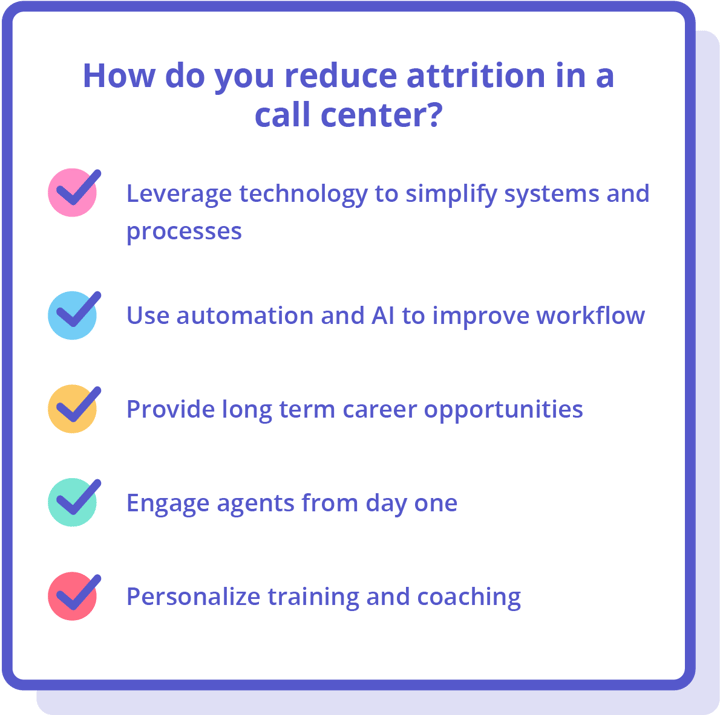What Causes Call Center Attrition and How to Reduce It

High call center attrition has been a long-standing challenge within the industry.
With current rates of attrition soaring as high as 65 to 80%, the urgency to implement effective strategies for retaining agents has become critical.
Currently, a third of agents are actively seeking alternative employment, often stemming from a lack of satisfaction in their roles. Research shows that when agents are satisfied with their job, they are more than twice as likely to remain committed to the organization.
The consequences of high attrition are detrimental to call centers. Poor agent performance, low productivity levels, and high costs spent on recruitment are just some of the problems that occur from constant turnover, ultimately compromising the ability to build a skilled team of agents.
Understanding the causes of high attrition and how to effectively manage it in order to retain employees are necessary steps to retain a long-term and dedicated workforce.

What is call center attrition and how is it measured?
Call center attrition occurs when an agent leaves their job, and their position cannot be immediately filled. Agents may depart voluntarily or involuntarily. Finding a new job opportunity or being let go due to poor performance or misconduct are some of the most common reasons.
Attrition rate, which is the opposite of retention rate, is calculated as the percentage of agents who leave a call center within a specific period of time (such as per year).
To accurately measure attrition rate, divide the number of agents who left within the specific period by the total number of agents employed in the call center during that time.
For example, if 100 agents were employed last year, and during that period, 70 agents left their positions, the total attrition rate would be calculated as 70/100 = 70%.
What causes high attrition in a call center?
No variety in daily workflow
When agents are given mundane and repetitive tasks on a day-to-day basis, their motivation to excel in their role inevitably diminishes. Consistently being exposed to low-value work creates a sense of disengagement, gradually lessening agents’ commitment to the job and eventually leading to turnover.
Inefficient and outdated technology
Technology in a call center should seamlessly support agent workload. When technology is difficult to use, it creates unnecessary friction and stress. Struggling with inefficient software or navigating too many systems and screens hinders productivity and leads to frustration and burnout.
Insufficient training and support
A poor onboarding experience leaves agents unprepared for the job. Lengthy training programs that span weeks or even months often lead to feelings of overwhelm. And when agents aren’t provided with regular guidance and support, their confidence diminishes as they become unsure of the next steps in their role.
No career advancement opportunities or recognition
Without a clear vision of career trajectory and a path of upward mobility in the organizational chart, agents become demotivated and won’t remain committed to the company for long.
On the other hand, when agents can see how their role contributes to the overall success of the organization and when they feel genuinely appreciated by their leaders, it cultivates a sense of belonging and purpose.
Lack of collaboration and company culture
Creating a positive work environment is crucial for reducing call center attrition. By actively encouraging collaboration with methods such as feedback sessions, including everyone in important company meetings, and encouraging team participation, agents become essential contributors to the larger organizational context.
Hostile customers
Customers play an important role in the agent’s work experience. When customers express anger and frustration, agents bear the brunt of it. Constantly handling complex calls and managing rising call volumes inevitability leads to encounters with dissatisfied customers—and unhappy customers equal unhappy agents.

How do you reduce attrition in a call center?
To reduce call center attrition, organizations must implement effective strategies that prioritize the agent experience.
Below are the most effective ways to encourage agents to stay in their roles and, in turn, deliver exceptional customer experiences.
Leverage technology to simplify systems and processes
Agent efficiency and job satisfaction strongly rely on the technology they use. When given difficult and fragmented systems, agents waste valuable time navigating rather than devoting their full attention to supporting customers.
To reduce any unnecessary friction and optimize workload, it is crucial to simplify agent systems and processes by implementing effective, up-to-date technology.
A cloud-based knowledge management system centralizes company documentation into a single source of truth and enables agents to access information exactly when they need it, where they need it. With user-friendly navigation, agents can easily execute processes step by step, resulting in improved performance and productivity, consistent customer interactions, and a heightened sense of confidence and job fulfillment.
Use automation and AI to improve workflow
Disconnected systems and repetitive, low-value tasks are some of the most common challenges that agents face in the call center.
Automating workload through AI-driven solutions significantly reduces agent effort, allowing agents to focus on what they do best: supporting customers. This increased call center efficiency results in a higher level of agent confidence and job satisfaction.
Removing the time-consuming effort of searching for answers to customer problems is an effective way to decrease agent effort. With AI-powered conversation guidance, agents receive accurate solutions to customer queries in real time. This automation tool enables agents to internalize knowledge faster, improve productivity, and take on an active, problem-solving role.
Reducing the number of systems and screens that agents navigate daily empowers them to work with greater efficiency. With the inconvenience of multitasking and constant tab switching eliminated, agents can fully engage during interactions and resolve customer issues faster.
Provide long term career opportunities
Companies that foster a culture of continuous learning and improvement, along with providing clear career growth opportunities, are more likely to retain a dedicated and loyal workforce.
Statistics reveal that 55% of customer service agents view their roles as a career, and only 12% envision an end to their tenure, indicating that a substantial number of agents want to stay with their company and are eager to advance in their roles. This signifies that agents can be retained when they are given the chance for progression.
By offering agents opportunities to gain knowledge and learn new skills, call centers can address skill shortages and pave the way for agents to transition into management roles, providing them with a clear career trajectory within the organization. Expanding agents’ skill sets not only prevents attrition, but also generates a team of highly productive and invaluable employees.
Engage agents from day one
Engaged agents are more likely to demonstrate dedication to their roles, as they consistently go the extra mile for customers and achieve high-performance ratings. On the contrary, disengaged agents are 3.3 more likely to leave their company.
To prevent attrition, call centers must implement ways to actively engage agents from the first day of onboarding.
Traditional lecture-style classroom training can quickly lead to burnout and decreased motivation among new hires. Alternatively, utilizing an interactive learning approach, such as scenario-based learning, promotes active learning and proves to be an effective way to engage agents both in the classroom and in production. It empowers new agents to grasp complex processes with ease, accelerating their proficiency and resulting in increased confidence as agents transition to taking live customer calls.
Personalize training and coaching
Agents come from a wide variety of backgrounds, each possessing unique talents and abilities. For this reason, personalized training and coaching sessions that consider individual strengths, skills, and learning needs are essential for agents to gain confidence in their work.
By taking into account each agent's strengths and weaknesses, as well as their potential career trajectory, call center trainers and leaders can establish positive relationships with agents. Additionally, embracing personalized learning opportunities demonstrates a genuine investment in the growth and development of each agent.
Call centers that play an active role in their agents’ success create a strong incentive for them to remain committed and motivated to further advance within the organization.

Reducing call center attrition is key to success
To ensure the retention of a committed workforce, contact center leaders must focus on creating an optimal agent experience.
When the challenges of call center attrition are proactively addressed, the entire organization benefits. Agents are satisfied with their work, customers receive exceptional support, call center efficiency increases, and significant cost savings related to recruitment are achieved.


